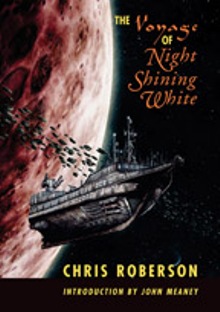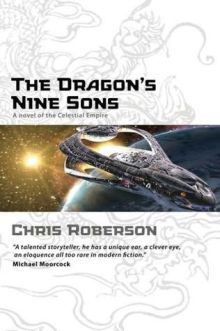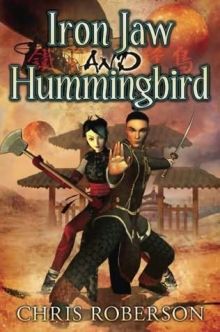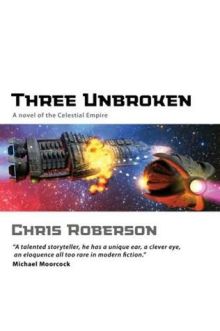Chris Roberson is the author of 12 novels and some 35 short stories, many of them awarded, nominated, or reprinted in various Year’s Bests. He’s the editor of the anthology, Adventure Vol 1., and he’s the co-owner and publisher (along with wife Allison Baker) of Monkeybrain Books, itself a very noteworthy independent press. He has been a finalist for the World Fantasy Award four times—once each for writing and editing, and twice for publishing—twice a finalist for the John W. Campbell Award for Best New Writer, and three times for the Sidewise Award for Best Alternate History Short Form (winning in 2004 with his story “O One“). But since the earliest of these works appeared in 2003, and his first novel, Here, There & Everywhere, in 2005, you can be forgiven if he’s not yet tracking on your radar.
But I’m going to set out to change that…
I first met Chris at the World Fantasy Convention in Montreal in 2001. At that same convention, I managed to place my first pro-rate anthology, Live Without a Net, with Jennifer Heddle, then at Roc. It was an anthology of “anti-cyberpunk” stories—or rather, stories in which some trope of cyberpunk (VR, uploaded consciousness, digital avatars, etc.) had been removed and replaced with an alternate technology or magic that served the same function. I invited Chris to contribute, and a few weeks after the convention he sent me “O One.” It was a story set in an alternate history in which the Chinese Treasure Fleets of the 15th Century never turned away from their exploration of the globe and a world-spanning Chinese Empire resulted. In the tale, a man from the conquered territory of Great Britain has arrived with what is essentially a Babbage Engine,  and presents it to the Emperor for his patronage, earning him a dangerous rivalry with the abacus-wielding Minister of the Imperial House of Calculation. I loved the story, and so did a lot of others (see the Sidewise Award above). But one thing about the tale struck me. As an aside, it is mentioned that the Emperor’s interest in computers is to facilitate his desire to explore space, and I was really struck by the notion of a space-faring Chinese Empire. I asked Chris if he’d follow up on this. He admitted that the story was a one-off, but I got him thinking. The result was The Voyage of Night Shining White, about a fleet of ships en route to Mars (or “Fire Star” as the Chinese call it) and a disaster that befalls the last ship in line. It’s a sort of Master and Commander in space, with a eunuch who carries his missing member in a jar in the Russell Crowe lead. The Captain, whose mutilation was actually the result of a position of honor that his father volunteered him for, has hard choices to make when Night Shining White’s nuclear reactor malfunctions and threatens to drown the ship in radiation. The story is classic space opera mapped onto brilliant alternate history speculation and non-Western culture. Still one of my favorite bits of Roberson’s fiction, the novella was published by PS Publishing, and later included in Jonathan Strahan’s Best Short Novels 2007. And thus was born Chris’ Celestial Empire series, which to date encompasses twelve short stories and three novels and stretches across hundreds of years of alternate history. (Chris wrote an article for Vector magazine issue #254, which is now online and explains some of the counterfactural elements of this series in more detail, called “History Repurposed.”) So far, three of the stories have been reprinted four times in Year’s Bests, been nominated for three awards (one of which they won), and the whole Celestial Empire sequence has proven among his most popular work.
and presents it to the Emperor for his patronage, earning him a dangerous rivalry with the abacus-wielding Minister of the Imperial House of Calculation. I loved the story, and so did a lot of others (see the Sidewise Award above). But one thing about the tale struck me. As an aside, it is mentioned that the Emperor’s interest in computers is to facilitate his desire to explore space, and I was really struck by the notion of a space-faring Chinese Empire. I asked Chris if he’d follow up on this. He admitted that the story was a one-off, but I got him thinking. The result was The Voyage of Night Shining White, about a fleet of ships en route to Mars (or “Fire Star” as the Chinese call it) and a disaster that befalls the last ship in line. It’s a sort of Master and Commander in space, with a eunuch who carries his missing member in a jar in the Russell Crowe lead. The Captain, whose mutilation was actually the result of a position of honor that his father volunteered him for, has hard choices to make when Night Shining White’s nuclear reactor malfunctions and threatens to drown the ship in radiation. The story is classic space opera mapped onto brilliant alternate history speculation and non-Western culture. Still one of my favorite bits of Roberson’s fiction, the novella was published by PS Publishing, and later included in Jonathan Strahan’s Best Short Novels 2007. And thus was born Chris’ Celestial Empire series, which to date encompasses twelve short stories and three novels and stretches across hundreds of years of alternate history. (Chris wrote an article for Vector magazine issue #254, which is now online and explains some of the counterfactural elements of this series in more detail, called “History Repurposed.”) So far, three of the stories have been reprinted four times in Year’s Bests, been nominated for three awards (one of which they won), and the whole Celestial Empire sequence has proven among his most popular work.
 The first Celestial Empire novel to appear was The Dragon’s Nine Sons, published by Solaris Books in 2008. The book, which is highly filmable, is a sort of Dirty Dozen or Seven Samurai in space. At this point in the Celestial Empire tales, the Chinese have reached Mars and begun colonizing, only to find that Earth’s other empire, fierce Mexica who evolved from an Aztec empire that never contended with Cortez or the rest of Spain, have reached the planet as well. A war has broken out between the blood-thirsty Mexica and the Chinese, and The Dragon’s Nine Sons is a window into one desperate mission in the context of that war.
The first Celestial Empire novel to appear was The Dragon’s Nine Sons, published by Solaris Books in 2008. The book, which is highly filmable, is a sort of Dirty Dozen or Seven Samurai in space. At this point in the Celestial Empire tales, the Chinese have reached Mars and begun colonizing, only to find that Earth’s other empire, fierce Mexica who evolved from an Aztec empire that never contended with Cortez or the rest of Spain, have reached the planet as well. A war has broken out between the blood-thirsty Mexica and the Chinese, and The Dragon’s Nine Sons is a window into one desperate mission in the context of that war.
Zhuan Jie is the Captain of the Exhortation. He’s on patrol over Fire Star when he’s commandeered by a superior office on another vessel into a blockade aimed at preventing a Mexica spacecraft leaving the planet. He’s ordered to stop the ship no matter what and told, “Throw anything and everything in that launch vehicle’s path, up to and including your ship’s hull.” But he isn’t told what is on board the Mexica craft or why it matters. When it comes to it, Zhuan Jie isn’t willing to throw his life, and the life of his entire crew, away, and he lets the Mexica ship through. The apparent cowardice (or refusal to throw away his life so blindly) costs Zhuan Jie his career.
Next we meet Bannerman Yao Guanzhong, a soldier who puts Klingon levels of honor to shame. He has the misfortune to have been too good, heroically interfering in a mission that his superiors wanted left alone, and witnessing something he shouldn’t have seen. This brave soldier has been at the wrong place at the wrong time, and is now an embarrassment and a casualty of a less-honorable style of warfare.
You can see where this is heading, right? Zhaun and Yao, along with seven other disgraced soldiers, are given command of a captured Mexica vessel—one powered by blood sacrifice—and sent on a suicide mission to destroy a hollowed out asteroid named Xolotl that the Mexica are using as a stronghold from which to conduct raids on the planet. But when they arrive, they find dozens of Chinese prisoners marked for human sacrifice, and their suicide mission turns into a rescue operation, and one with implications for the secret Yao carries.
The novel is fast-paced, action-packed, tightly-plotted, and ingeniously conceived. It’s told in a somewhat detached narrative voice, which I take to be intended to give us a flavor of reading a work in translation (from the Chinese) or else reading a bit of history, but it doesn’t detract from what is a very gripping work in its own right, as well as being a great introduction to the Celestial Empire universe. (You can download a sample chapter in the form of a PDF here or read the first three chapters here at Bookspot Central.)
 The next novel in the series is Iron Jaw and Hummingbird, a Young Adult novel from Penguin’s Viking imprint. I haven’t read this one yet, but I can tell you it’s about two teenagers on Mars who join forces to take on a corrupt government. Chris told Sci Fi Wire, “One is Gamine, or ‘Iron Jaw,’ a kind of Pygmalion figure who is brought off the streets as a child, educated and trained and then, when her usefulness to her patron is over… tossed back onto the streets. The other is Huang, or ‘Hummingbird,’ the wastrel son of a merchant family who is packed off to military service to save his family any further embarrassment, but who runs afoul of bandits before reaching his first posting.”
The next novel in the series is Iron Jaw and Hummingbird, a Young Adult novel from Penguin’s Viking imprint. I haven’t read this one yet, but I can tell you it’s about two teenagers on Mars who join forces to take on a corrupt government. Chris told Sci Fi Wire, “One is Gamine, or ‘Iron Jaw,’ a kind of Pygmalion figure who is brought off the streets as a child, educated and trained and then, when her usefulness to her patron is over… tossed back onto the streets. The other is Huang, or ‘Hummingbird,’ the wastrel son of a merchant family who is packed off to military service to save his family any further embarrassment, but who runs afoul of bandits before reaching his first posting.”
 The final-to-date Celestial Empire novel is the just-released Three Unbroken, out in mass market from Solaris books now. This novel continues the war between the Chinese and the Aztecs, focusing on the life of three soldiers and following them through training to their battles on the front line. The novel is unusual in that each of its chapters is based on one of the 64 elements of the I-Ching. 42 of these chapters are available to read online.
The final-to-date Celestial Empire novel is the just-released Three Unbroken, out in mass market from Solaris books now. This novel continues the war between the Chinese and the Aztecs, focusing on the life of three soldiers and following them through training to their battles on the front line. The novel is unusual in that each of its chapters is based on one of the 64 elements of the I-Ching. 42 of these chapters are available to read online.
Now, for the completist of you out there, we have…
The Celestial Empire stories:
(listed in internal chronological order, rather than publication order; links to stories online)
-
“Fire in the Lake” Subterranean Magazine, Fall 2007
-
“Thy Saffron Wings” Postscripts #15
-
“The Sky is Large and the Earth is Small” – Asimov’s Science Fiction (July, 2007) and in The Best Science Fiction and Fantasy of the Year Volume 2 and The Year’s Best Science Fiction, Twenty-Fifth Annual Collection
-
“O One” – Live without a Net (Roc, June 2003)
-
“Metal Dragon Year” Interzone #213
-
“Gold Mountain” – Poscripts #5 (and in The Year’s Best Science Fiction, Twenty-Third Annual Collection)
-
“Mirror of Fiery Brightness” – Subterranean Magazine, Fall 2008
-
“The Voyage of Night Shining White” Novella from PS Publishing (and in Best Short Novels: 2007)
-
“Line of Dichotomy” – The Solaris Book of New Science Fiction: Volume 2 (Solaris, 2008; also available as chapbook)
-
“Red Hands, Black Hands” – Asimov’s Science Fiction (December, 2004)
-
“All Under Heaven” – Firebirds Soaring (Firebird, 2009)
-
“Dragon King of the Eastern Sea” – We Think, Therefore We Are (DAW, 2009)










